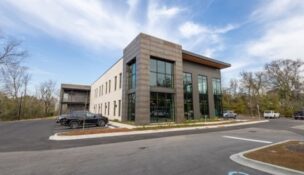Q&A: SC Realtors president on the state’s ‘normalizing’ housing market
Ross Norton //September 20, 2022//
Q&A: SC Realtors president on the state’s ‘normalizing’ housing market
Ross Norton //September 20, 2022//

Below is a Q&A with with South Carolina Realtors' President Cindy Creamer.
From the time we first heard the word “coronavirus,” the real estate market responded first by coming to a complete (although brief) stop, then taking off like rocket before calming down somewhat. And now we have the uncertainty associated with rising interest rates. Would you call this thrill ride exhausting or exhilarating?
From the start of the pandemic, Realtors were working with local, state and national officials to make sure the business of real estate, the transaction of real property, was still able to take place. Many states shut down their economy for weeks, even months. We worked with our local officials to make sure deed recording offices had the capacity to record deeds and mortgages. We worked with Gov. Henry McMaster and his team to ensure that real estate was declared as essential to the economy. Realtors know that in times of crisis, even a global pandemic, homeownership, the transfer of real property and basic shelter is essential to the public good. These last two years have been stressful, but the one thing that makes the hard work worthwhile is that Realtors have been the trusted advisers that have helped thousands of homeowners navigate this robust and challenging market.
Where do you think the South Carolina market is now and what does it need to be healthy moving forward?
 The market in our state is normalizing. Yes, it’s cooling off compared to 2020 and 2021, but it is still a demand-driven market, unlike the late 2000s when we were dealing with a supply driven market. I believe we need more inventory at various price points, especially on the first-time buyer side. Working class families are being squeezed by the three-eyed (I) monster — inflation, interest rates and inventory. Our National Association of Realtors reports that a typical home is almost 50% more expensive than just a year ago when you factor in the 3 I’s. Until interest rates stabilize and inventory increases to a five-six month level (instead of a two-three month level).
The market in our state is normalizing. Yes, it’s cooling off compared to 2020 and 2021, but it is still a demand-driven market, unlike the late 2000s when we were dealing with a supply driven market. I believe we need more inventory at various price points, especially on the first-time buyer side. Working class families are being squeezed by the three-eyed (I) monster — inflation, interest rates and inventory. Our National Association of Realtors reports that a typical home is almost 50% more expensive than just a year ago when you factor in the 3 I’s. Until interest rates stabilize and inventory increases to a five-six month level (instead of a two-three month level).
What needs to happen to keep a robust real estate market robust?
The obvious answer is to keep the three I’s in check — grow the economy to keep inflation in check, stabilize interest rates and increase inventory. The other answer isn’t so obvious — our local and state leaders have to continue to focus on making South Carolina the best state to live, work and play in the country. Our strong industry, tourism and economic growth has not happened by accident — we have to continue to lead and SC Realtors will continue to advocate for economic growth that enhances the quality of life of our citizens.
It appears that the inventory numbers are up from a year ago when buyers were sometimes making desperate offers. Are they?
Inventory numbers are up from a year ago but let’s look at the numbers from the last few years for a better perspective. According to SC REALTOR market reports, we ended 2018 with a four-month inventory supply level, 2019 was 3.6 months, 2020 was 1.9 months, 2021 was 1.3 months and, as of the end of July in 2022, we’re at 1.9 months. While the data shows a 46% increase in inventory from a year ago, as you can see South Carolina is still well below historical averages and remarkably below the industry recognized six months of inventory (which most economists say is the average supply for a normal market). We haven’t seen six months of inventory since 2014.
Is the potential for more interest rate hikes pushing potential buyers to take action?
The Federal Reserve indicated again on Aug. 9 that they will likely increase interest rates again, but it is not necessarily bad news. We’ve seen over the last few months that the mortgage rates don’t follow the interest rates on a point-by-point basis. I don’t think the fear of future mortgage rates increases will cause buyers to act, we’ve seen that bump already and buyers that need to buy will buy, but their buying power will be decreased.
Have the low rates of recent years spoiled us into thinking 6% is outrageous? How long ago was 6% a pretty desirable interest rate?
I agree that we have become comfortable with historic low interest rates. The 50-year average is just below 8%. The market reacts and adapts as interest rates change. Remember, properties sold even when mortgages were over 16% in the early 1980s. The fact remains, however, that mortgages have almost doubled in the past year. Factoring in inflation and other economic pressures, the impact of these increases will be to further increase the cost of housing for first time buyers and working families in our state. A 6% interest rate alone likely wouldn’t have a very big impact on the housing market, but when you factor in the other two I's, the cost of housing has increased as much as 50% in some areas.
Do home buyers wait for market opportunities or do most buyers take action regardless of market conditions such as inventory and interest rates?
Life events require the transaction of real property — new job transfer, marriage, divorce, births, deaths, retirement, etc. Most buyers buy when life events require them to buy. Investors try to take advantage of market conditions for the best returns, but the majority of buyers are dealing with transitional, emotional events in their life which makes working with a trusted adviser, their local Realtor, even more important.
What is the most significant challenge facing the residential real estate industry right now?
We’ve talked about the inventory levels being low but that doesn’t do justice to the problems it has caused in our local communities. All the factors we’ve talked about have led to escalating home prices, which has squeezed working class homeowners and homebuyers. For many of our communities, those that serve our communities (police, teachers, first responders, etc.) cannot afford to live in the community they serve. They are forced into long commutes which puts stress on our infrastructure and exacerbates urban sprawl (traffic, congestion, etc.) We’ve got to find solutions to address workforce housing because it is already affecting our small businesses.
What do you wish everyone knew about residential real estate?
Not as easy as it looks!
Why should someone us a professional — an agent or Realtor — when buying or selling a residence?
Buying a home, whether it’s your first home or your retirement home, can be a very emotional process. Throw in all the other market factors we’ve discussed and you can see how difficult buying or selling a home can be in any market.
Realtors are members of the National Association of Realtors, who are bound and held accountable by a code of ethics while helping their clients and customers navigate one of the most complicated and important transactions they will make in their lifetime.
When you work with a Realtor you work with a professional committed to safeguarding the rights of home buyers and sellers. Through local, state and national advocacy efforts, Realtors seek to preserve, protect and advance property rights for all.
Realtors adhere to a standard that requires equal professional service, because all properties should be open and feel welcome to all.
That’s the Realtor difference.
Cindy Creamer is president of South Carolina Realtors. She is an agent with Dunes Real Estate in Hilton Head.
e















